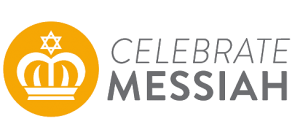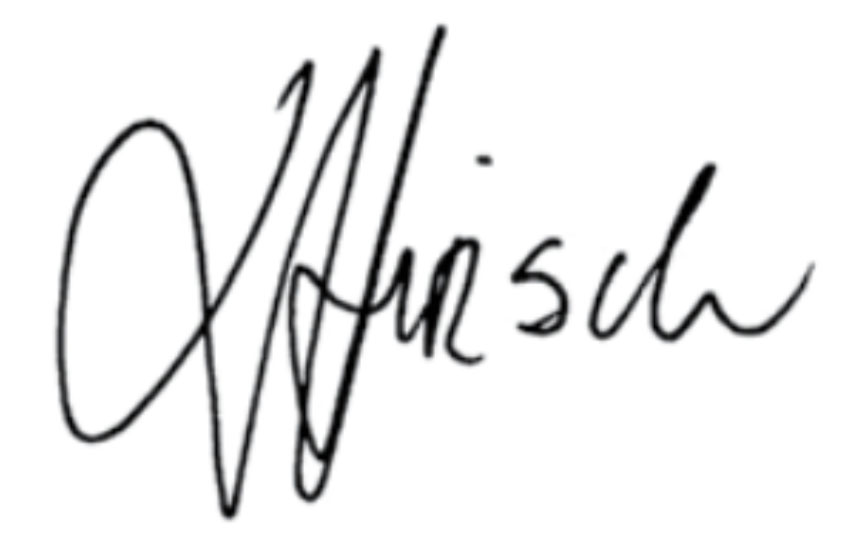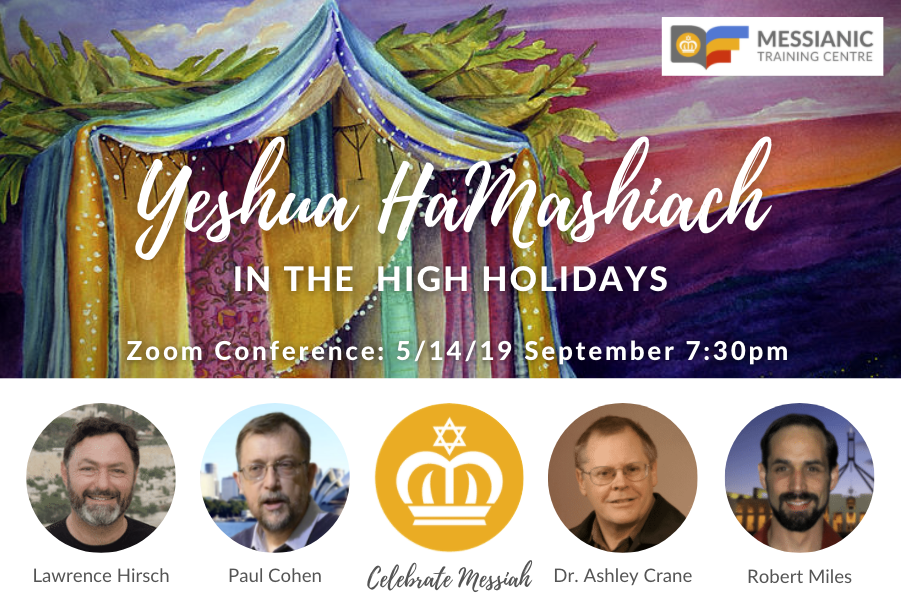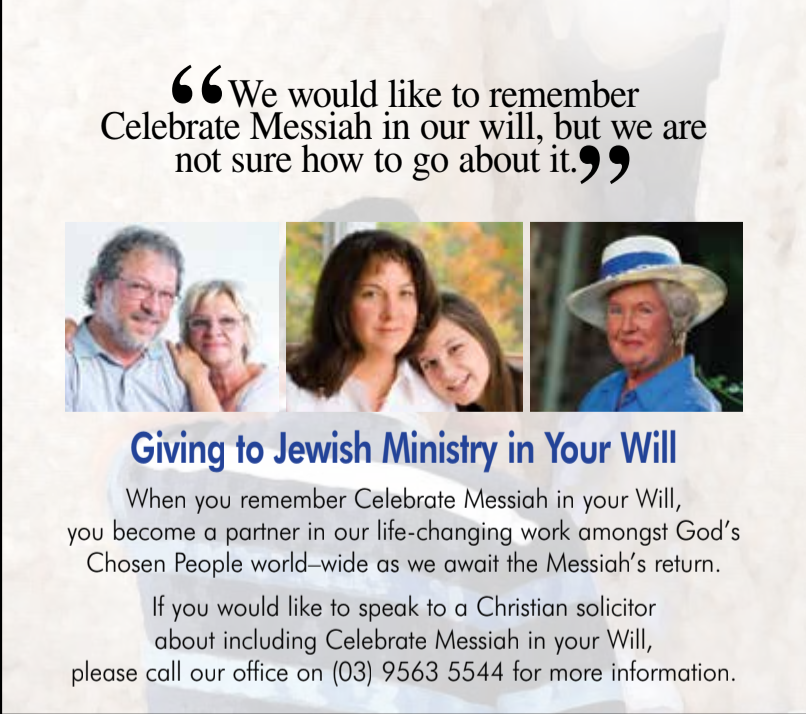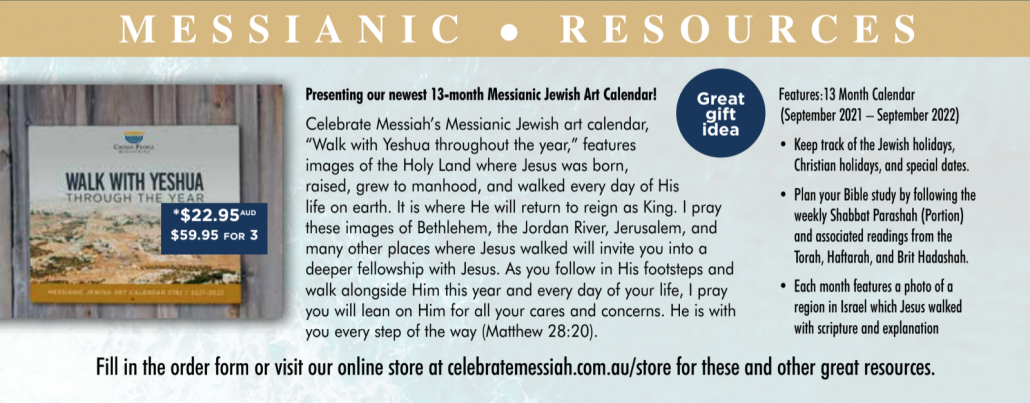Shalom and happy Jewish New Year!
I am greeting you with a Happy New Year because Jewish people around the globe recently celebrated the Jewish New Year, called Rosh Hashanah. This month, we begin the Hebrew year 5782. Jewish tradition dates the new year from when creation is believed to have taken place.
We are now in the seventh month of the Jewish calendar, the month of Tishrei, which is the holiest month of the year. During this month, we celebrate the Biblical feasts; the Feast of Trumpets (Yom Teruah), the Day of Atonement (Yom Kippur) and the Feast of Tabernacles (Sukkot).
For religious Jewish people, the first two festivals can be somewhat somber observances as we are called to remember our sin, repent of our sin, and then turn to God for forgiveness. However, as Messianic Jews, we approach this time of the year in a somewhat different way. Yes, the sound of the shofar reminds us to repent of our sin, however, as believers in Yeshua the Messiah, we know that our sin has been paid for by the death of the Messiah and by his shed blood on our behalf.
Sadly, due to continued lockdowns across the country, we have not been able to celebrate these festivals as we normally do, with our family and spiritual community face-to-face. We have however, been streaming special services as well as presented an online webinar called “Yeshua HaMashiach in the High Holidays. You can access these events from our website at www.celebratemessiah.com.au/live.
The Time Has Come—Again!
The Jewish New Year is not like the secular New Year. In Leviticus 23:22–23, you will not find the words “new year” used to describe the festival; instead the Bible describes the day as the blowing of the trumpet. On this day, according to the rabbis, God opens the books of life and death. Jewish people have ten days to get right with God, so the Jewish New Year begins a sobering and serious season of reflection. The trumpet blown on Rosh Hashanah is called a shofar (a ram’s horn) in Hebrew, and it is sounded to call the Jewish people to repentance before the Day of Atonement, the most sacred day of the Jewish year that follows ten days later.
According to Leviticus chapter sixteen, the high priest offered sacrifices of a bull and a goat on the altar. He then sprinkled the blood on the mercy seat to make atonement for sins not previously atoned for because of disobedience or ignorance. It was only on this day of Yom Kippur that the high priest stepped into the Holy of Holies, beyond the veil, and did what human beings could never do for themselves. The Hebrew Scriptures clearly teach that none of us can do anything to merit forgiveness of sin. The “making of atonement” is always done by someone other than ourselves.
The Ten Days of Awe
 At the end of these ten days of repentance (known as the Days of Awe), we sound the shofar once again. Tradition tells us that God shuts the books of life and death as His last act on the Day of Atonement. At that moment, the fate of every Jewish person is sealed for the coming year. If we performed an adequate number of good works and thoroughly repented of our sins, then we would have a good year and find favor with God. If not, we would experience some type of judgment during that year. The results of our efforts – repentance, prayer, and fasting – last only a year, as the process must be repeated annually.
At the end of these ten days of repentance (known as the Days of Awe), we sound the shofar once again. Tradition tells us that God shuts the books of life and death as His last act on the Day of Atonement. At that moment, the fate of every Jewish person is sealed for the coming year. If we performed an adequate number of good works and thoroughly repented of our sins, then we would have a good year and find favor with God. If not, we would experience some type of judgment during that year. The results of our efforts – repentance, prayer, and fasting – last only a year, as the process must be repeated annually.
However, as believers in Messiah Yeshua, we have complete confidence that Messiah died for our sins “once for all,” according to Hebrews 7:27. We are forgiven! That is the reason I wish my believing friends a Happy New Year and Day of Atonement.
The psalmist promised that one day God would remove our sins as far as the east is from the west (Ps. 103:12). In Jeremiah 31:31–34, the prophet told us that the day is coming when the Lord will write His law on our hearts and forgive our sins. This hope of forgiveness caused the Jewish people to look forward to this great day of redemption throughout the darkest periods of Jewish life.
The Prophecy of the Binding of Isaac
The binding of Isaac in Genesis chapter twenty-two presents a beautiful prophetic portrait of this predicted hope of an ultimate sacrifice for sin. In this chapter, which is read every year in synagogues on Rosh Hashanah, God asked Abraham to climb Mount Moriah and sacrifice his son, Isaac.
Abraham and Isaac began walking toward the mountain. On the third day, Isaac innocently asked his father, “Behold, the fire and the wood, but where is the lamb for the burnt offering?” What a haunting question! Abraham responded that “God will provide for Himself the lamb for the burnt offering, my son” (Gen. 22:7–8).
Upon their arrival, Abraham bound his son and laid him on the altar. At that moment, I am sure Isaac thought his question was answered and that he was the sacrifice. But when the patriarch raised his knife, the angel of God stopped him!
The angel of the Lord called to him from heaven and said, “Abraham, Abraham!” And he said, “Here I am.” He said, “Do not stretch out your hand against the lad, and do nothing to him; for now I know that you fear God, since you have not withheld your son, your only son, from Me.” (Gen. 22:11–12)
Abraham looked toward the bushes and saw a ram caught in the thicket by his horns and sacrificed the ram instead of Isaac (Gen. 22:13). The horns that trapped the ram are why in traditional Judaism we sound the shofar on Rosh Hashanah. Hearing the sound from the ram’s horn reminds us that God provides the sacrifice.
We also understand that the Temple, the holy place where God ordained sacrifices to be made, was built on this same Mount Moriah. “Then Solomon began to build the house of the Lord in Jerusalem on Mount Moriah, where the Lord had appeared to his father David, at the place that David had prepared on the threshing floor of Ornan the Jebusite” (2 Chronicles 3:1).
My heart of faith wholeheartedly believes that Genesis chapter twenty-two points to Yeshua. Yeshua is the beloved Son of the Father, just as Isaac was Abraham’s promised beloved son. Yeshua was willing to lay down His life, but unlike Isaac, who was spared, Yeshua was slain. Ultimately, He was crucified and died on this same mountain range within eyesight of the Temple Mount where literally multiple thousands of animals would be sacrificed between the almost-death of Isaac and the atoning death of our Messiah Yeshua.
Abraham named the sacred site, as described in verse fourteen, “Abraham called the name of that place The Lord Will Provide, as it is said to this day, ‘In the mount of the Lord it will be provided.’” He identified God Himself as the provider of the one sacrifice that really counts! In the fullness of time, God allowed His Son to die on a cross made of unhewn wood to accomplish what neither the potential sacrifice of Isaac nor the blood of bulls and goats for centuries could ever achieve. It was on Mount Moriah where God provided the gift of His only beloved Son, and it is through His shed blood that, by faith, we find everlasting atonement for our sins. We have peace with God through the death of Jesus, who died and rose for our sins.
As the Apostle Paul wrote, “Therefore, having been made righteous by trusting, we have shalom with God through our Lord Yeshua the Messiah.” (Romans 5:1, TLV)
 He did not stop there, though. The rabbi from Tarsus continued:
He did not stop there, though. The rabbi from Tarsus continued:
“For while we were still helpless, at the right time Messiah died for the ungodly. For rarely will anyone die for a righteous man—though perhaps for a good man someone might even dare to die. But God demonstrates His own love toward us, in that while we were yet sinners, Messiah died for us. How much more then, having now been set right by His blood, shall we be saved from God’s wrath through Him.” (Romans 5:6–9, TLV)
Having embraced this great salvation through the Messiah Yeshua when I was twenty years old, I can tell you that it is true, and this decision changed the way I have observed the Jewish high holidays for all these years. I personally know the joy of forgiveness, and I hope you do as well!
Please pray for Your Mission to the Jewish People as we proclaim the glorious message of Yeshua’s atoning work as prophesied in the Hebrew Scriptures. I also hope this will help you pray for your Jewish friends. Please pray, as we share the message of salvation through the “greater” son of Abraham during the rest of this month. Finally, please pray the Lord will open the eyes of our beloved Jewish people to see that He is the true Messiah for all.
Thank you for your prayers and support of our 26-year-old ministry among the Jewish people. Your partnership is deeply appreciated and certainly needed at this time.
Blessings and again Happy New Year,
Lawrence
P.S. We have a beautiful Celebrate Messiah Jewish Art Calendar that you can order on our website at www.celebratemessiah.com.au/store. This beautiful calendar will help you learn more about the places in Israel where Yeshua walked, and enable you to dig deep into the Jewish background of your faith.
ISRAEL’S INTERCESSOR: The High Priest
Whenever the Israelites had the privilege of encountering the living God, they were terrified: “Woe is me, for I am ruined! Because I am a man of unclean lips…. My eyes have seen the King, the Lord of hosts,” the prophet Isaiah exclaimed in horror (Isa. 6:5). Imagine what it would have been like to see what Isaiah saw; to experience the depth of his shame before the holy God!
The Israelites at Mount Sinai had a similar experience. Each of them visually experienced the glory of the Lord “like a consuming fire on the mountain top” (Exodus 24:17), and they learned that “the Lord your God is a consuming fire, a jealous God” (Deuteronomy 4:24). Here is how Exodus describes the people’s initial response to their experience of God:
All the people perceived the thunder and the lightning flashes and the sound of the trumpet and the mountain smoking; and when the people saw it, they trembled and stood at a distance. Then they said to Moses, “Speak to us yourself and we will listen; but let not God speak to us, or we will die.” (Ex. 20:18–19)
The people were ill-prepared to stand in the presence of God. After reassuring them of God’s purposes, Moses climbed to the top of Mount Sinai to hear from God alone (Ex. 20:20–21). God spoke to Moses (v. 20:22ff.) and later “face to face, just as a man speaks to his friend” (Ex. 33:11). Although God desired a close relationship with all Israel, the relationship between Moses and God was unique and intimate. At the request of the people (v. 20:19), God allowed Moses to stand in an intercessory place between Him and the nation.
The God of Israel had called the Jewish people to receive His promised covenant blessings sworn to Abraham (Genesis 12:1–3). The Lord also chose the children of Israel to be a holy nation (Exodus 19:6), but throughout biblical history, we see that their sins often alienated the chosen people from God.
Thankfully, the Lord of Israel is also a compassionate and gracious God (Exodus 34:6). By His mercy, He provided sacrifices and Levitical intercessors so Israel could be restored and live in fruitfulness and joy in the promised Land. Moses was the first and most significant of the intercessors between Israel and God. He was the first mediator; he alone ascended Sinai and appealed to the Lord on behalf of Israel, standing in Israel’s place as the nation’s representative. Moses passed his intercessory role on to his elder brother, Aaron, and his sons. Aaron had the privilege of serving as Israel’s first high priest (Exodus 28:1).
The Lord instructed Aaron and his sons “to make a distinction between the holy and the profane, and between the unclean and the clean, and so as to teach the sons of Israel all the statutes which the Lord has spoken to them through Moses” (Leviticus 10:10–11). The function of the high priest was also to be the final judge of the nation, the leader of the high court (cf., 2 Chronicles 19:11).
Teaching the sons and daughters of Israel was an essential role for Aaron and the priesthood, but their most important responsibility was interceding for the people of Israel. The Hebrew Bible uses a variety of terms to describe sin. One term, avon, עָוֺן, is usually translated “iniquity.” The Hebrew root means “bent or crooked,” thus envisioning our iniquity as causing our souls to appear bent and misshapen when compared to the straight line of the perfect image of God in which we were created. Sin is also portrayed as a weight that rests upon a person’s soul, which is why the Bible describes the individual sinner as “bearing his iniquity” (Leviticus 7:18, 17:16). This phrase vividly pictures a person weighed down with sin, laboring as he or she carries this weight upon his or her shoulders until atonement lifts the burden through an acceptable sacrifice.
 The Hebrew Scriptures describe the burden of iniquity as transferrable. When a Jewish person committed a sin, they were required to select a clean and healthy animal, often described as one without blemish, and bring it to the priests. The priest would sacrifice the offering, thereby transferring the burden of sin to the animal. As Leviticus 17:11 affirms, “For the life of the flesh is in the blood, and I have given it to you on the altar to make atonement for your souls; for it is the blood by reason of the life that makes atonement.”
The Hebrew Scriptures describe the burden of iniquity as transferrable. When a Jewish person committed a sin, they were required to select a clean and healthy animal, often described as one without blemish, and bring it to the priests. The priest would sacrifice the offering, thereby transferring the burden of sin to the animal. As Leviticus 17:11 affirms, “For the life of the flesh is in the blood, and I have given it to you on the altar to make atonement for your souls; for it is the blood by reason of the life that makes atonement.”
Nowhere is this transferrable burden of iniquity displayed more powerfully than on the Day of Atonement. God provides a vivid picture in biblical teaching of the scapegoat.
Then Aaron shall lay both of his hands on the head of the live goat, and confess over it all the iniquities of the sons of Israel and all their transgressions in regard to all their sins; and he shall lay them on the head of the goat and send it away into the wilderness by the hand of a man who stands in readiness. The goat shall bear on itself all their iniquities to a solitary land; and he shall release the goat in the wilderness. (Leviticus 16:21–22)
The process of atonement is worth noting carefully. As the priest confesses Israel’s sins, he places his hands on the goat, symbolically transferring the nation’s iniquities upon the animal. The scapegoat then carries the sins of the Israelites into the wilderness, far away from the Jewish people. The goat would perish, according to the instruction in Leviticus chapter 16, and carry the sins of Israel away with his death.
The scapegoat and the work of Aaron and his sons serving as Israel’s intercessors pointed to something greater! As the centuries went by, God began filling in the details of this hope and expectation of a greater and more permanent atonement. Ezekiel spoke of a day when God himself would atone for the people’s sins (Ezek. 45:17). Daniel prophesied a day when there would be a final end of sin and atonement for iniquity (Dan. 9:24).
The pinnacle of this prophetic expectation is in Isaiah 53, where we encounter the Suffering Servant who would one day bear our sins and take them away, just as the scapegoat did. At the end of this glorious chapter, Isaiah exalts the Servant who would be pierced through for our transgressions and crushed for our iniquities. The prophet announces that God will “allot [the Servant] a portion with the great. . .because he poured out Himself to death,” whereby He “bore the sin of many, and interceded for the transgressors” (Isa. 53:12).
Thankfully, we are not left without a high priest today. Although the Temple was destroyed in AD 70, extinguishing the flames upon the altar fanned by the Aaronic priesthood, Yeshua the Messiah established a greater priesthood through His resurrection for all who believe. Now, our Messiah intercedes as our high priest, carrying our burdens day in and day out…if we let Him!
As the author of Hebrews wrote,
“but he [Yeshua] holds his priesthood permanently, because he continues forever. Consequently, he is able to save to the uttermost those who draw near to God through him, since he always lives to make intercession for them. For it was indeed fitting that we should have such a high priest, holy, innocent, unstained, separated from sinners, and exalted above the heavens.” (Hebrews 7:24–26, ESV)
Ministry to a Broken World
A Word of Encouragement from Lawrence Hirsch
We have all been shaken and somewhat traumatised by the events that are going on around us. We are all trying to cope with the threat of COVID-19 and the subsequent lockdowns and loss of employment and income.
Some of us have already lost loved ones and friends to COVID-19, both locally and/or overseas, but due to lockdowns, we haven’t been able to properly mourn and grieve, as funeral attendance is so limited.
Right now, we are also experiencing much concern at the increased rate of infection across the country, especially in New South Wales and Victoria. It has also been quite a confusing time with all the information/misinformation and conspiracy theories that have surrounded the vaccine roll-out in Australia, and the efficacy of the vaccines. On top of that all, we have been traumatised by the tragic events in Kabul and Afghanistan.
I am pretty sure that many of us are experiencing a degree of PTSD (Post Traumatic Stress Disorder), depression, isolation, fear and anxiety. If you’re feeling that way, please reach out to others around you, and seek professional help from your doctor, and keep in touch with your faith community. It is so important not to cut yourself off from others.
With all the challenges that the world is facing, many people, including our Jewish people, are thinking about their immediate future, and the future of life on this planet. Many people are asking questions about life after death. This is certainly a time for us as believers to reach out to those around us.
Even though we may not have all the answers to the questions that people are asking at the moment, we do know that, as believers, our future is secure in Yeshua the Messiah. We know that we have our sins forgiven through the atoning sacrifice of the Messiah. Yeshua is our Great Intercessor. We know that we have the promise of eternal life through Him. And we know that we have a blessed hope of a glorious future because our faith and trust is in the Lord.
The Apostle Peter encourages us with these words:
“Blessed be the God and Father of our Lord Yeshua the Messiah! In His great mercy He caused us to be born again to a living hope through the resurrection of Messiah Yeshua from the dead. An incorruptible, undefiled, and unfading inheritance has been reserved in heaven for you. By trusting, you are being protected by God’s power for a salvation ready to be revealed in the last time.” (1 Peter 1:3–5, TLV)
Peter goes on to say that it is for this reason we can rejoice even though we are going through times of trial for a little while. Our faith is being tested and our lives are being purified. God wants us to draw near to him in these days, and he promises that he will use our testimony to draw others to himself.
Dear friends, as we go through these times of trial, may we completely rely on the Lord’s grace to sustain us, and may He use us to reach out to a broken world.
It is to this end that we labour through the ministry of Celebrate Messiah. We are endeavouring to use every opportunity afforded us through the challenges that this world is facing, to present Yeshua to the Jewish people and to whoever will hear.
In regards to the Jewish People, the Apostle Paul wrote:
“How then shall they call on the One in whom they have not trusted? And how shall they trust in the One they have not heard of? And how shall they hear without someone proclaiming? And how shall they proclaim unless they are sent? As it is written, “How beautiful are the feet of those who proclaim good news of good things!”” (Romans 10:14–15, TLV)
Even during these times of international upheaval and especially because of these times, we need to continue to proclaim the good news of Yeshua the Messiah to our Jewish people. But we cannot do this without your prayers and partnership. Please remember Celebrate Messiah in your prayers and in your giving.
Let us join together in praying for this world and let us not forget to pray for Israel and the Jewish people. Let us join together with the Apostle Paul who said:
“Brothers and sisters, my heart’s desire and my prayer to God for Israel is for their salvation.” (Romans 10:1, TLV)

CONVERSATIONS AT THE JORDAN RIVER
Recently, our Israel director and his wife were at the baptismal site on the Jordan River, where some filming for an episode for their daily program was done. Our staff member noticed a large group of Hebrew-speaking Israelis going down to the river. Immediately, he went to them, and they, for unknown reasons, started to ask questions about the place. Of course, the first thing he did was tell them about the events of Yeshua’s baptism. They continued to ask questions, and our staff member explained that the event that happened there two thousand years ago was completely Jewish and in accordance with the Hebrew Bible, and he later read from the New Testament. They were surprised to learn that what they considered exclusively a Christian sacrament was and is a fully Jewish ritual. Even more shocking to them was the revelation that Yeshua remained a faithful Jew, coming to save His own people. If that was not enough, they read a few prophecies (by Jewish prophets!) together that clearly made the case for Yeshua being the promised Messiah of Israel. They spent longer than half an hour together, exchanged contact info, and agreed to continue this conversation.
ISRAELI COMMANDER TALKS FAITH
Recently, a special person contacted one of our young staff members – his former commander from the Israel Defense Forces (IDF) – who was his drill officer when he started his military service and had been a very important figure in his formation as a soldier in the IDF. Out of the blue, Commander Levy* texted our staff member in the middle of June and asked him about his faith. Our staff member was not sure exactly what he was asking, so he offered to reconnect over the phone. They talked a few days later and spoke for two hours. Our staff member explained his faith and why he believes that Yeshua is the Messiah of the Jewish people. Commander Levy asked a lot of questions, and in the end, they prayed together. He was open to reading the Scriptures and admitted that Yeshua could possibly be the one about whom the prophecies are speaking. Please pray for him that Yeshua will continue working in his life. Our staff member agreed to set up weekly meetings to go through the Scriptures together to give him a better understanding of who Yeshua is and how he can grow closer to Him.
MINISTRY GROWS IN UKRAINE
This summer, our staff members visited eight cities in Ukraine and twelve Messianic congregations and churches, as well as organised and taught at two conferences: one for Messianic leaders and another for church leaders from the western part of Ukraine. The staff couple were the main speakers at a five-day retreat, with almost 150 participants from Messianic congregations all over the country. They taught twelve different seminars and more than thirty Bible studies. They also visited more than fifty Jewish people in their homes and prayed for their salvation and healing from different physical and spiritual problems. There were countless personal consultations and counselling, prayers, and deliverances. Messianic believers in Germany collected $2,000 for humanitarian aid for disabled, sick, and elderly Jewish people and orphaned children as well, and our staff members distributed this help through six Messianic congregations. There were many thankful tears and words from the recipients. As one elderly Jewish man said, “I don’t know that Yeshua is the Messiah yet, but I see and feel His love through you.” Those words are invaluable. Our staff member writes, “Honestly, some moments were overwhelming, but praise the Lord everything went very well and so many people were thankful for this help and what they have received through our ministry to them.”
UPCOMING EVENTS & TRAINING
Celebrate Messiah we believe that this is a time of training and evangelism. Please check out our various websites that are designed to equip the believer in sharing their faith with Jewish friends and family, hearing testimonies of Jewish believers in Yeshua and learning more about the Gospel in the Jewish festivals:
Download Newsletter
Would you like the full newsletter? Click on the Download button for the full PDF version.
Join our mailing list today!
*The newsletters are in PDF Format.
Give Today!
Join our mailing list today and stay up to date with all the latest news!
Sign Up for Our Email Newsletter
Sign up for Celebrate Messiah email newsletters to receive more information on our ministries, events, and outreach to the Jewish people around the world:
